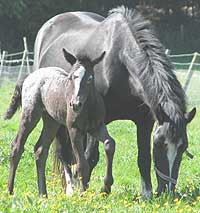
How to care for a mare in foal - preparing for foaling
 Breeding a foal from your own mare can be one of the most rewarding parts of owning a
horse.
Breeding a foal from your own mare can be one of the most rewarding parts of owning a
horse.
Caring for your pregnant mare while she is in foal is not too difficult; it is very much like looking after a normal mare with just a little more attention to detail.
Pregnancy in a mare lasts for about 340 days and in most cases there are no complications.
There is little need for specialist care for a mare in foal except to give additional feed during the last two to three months.
But we have a few hints and tips on how to care for your mare during her pregnancy.
WHAT TO FEED A MARE IN FOAL
The amount to feed a mare in foal will depend on her general condition - it is important that she does not become overweight as this makes foaling more difficult.
By the third trimester of the mare's pregnancy you should be adding mineral supplements to her diet.
EXERCISING AN IN FOAL MARE
Daily exercise is crucial for a mare in foal to help maintain tone in body muscles and general activity of the heart and lungs.
If you don't have suitable grazing, where the horse can exercise naturally, many pregnant mares can be safely ridden out for a short time each day - even late into pregnancy.
VACCINATIONS AND WORMING PRIOR TO FOALING
Vaccination, especially equine tetanus jabs, should be given a month before foaling.
This ensures that antibody levels in the mare will be highest at the time of foaling. This will then benefit the foal through the mare's colostrum.
Regular Worming during the mare's pregnancy will ensure that the mare does not contaminate the pasture with worm larvae for her foal to pick up.
BENEFITS OF GROOMING A MARE IN FOAL
Grooming helps to keep the in foal mare clean and also relaxed. If you form a claose relationship with your mare show her affection she is less likely to be aggressive towards her foal.
FOALING BOX
An important measure to take is to introduce the mare into her foaling quarters at least a month before the birth.
This gives the mare time to adapt to any minor infections that may be present and develop antibodies against them which will in turn benefit her foal.
Straw is recommended as the most suitable bedding for a foaling box. If good wheat straw is not available, oat straw is a good alternative.
Allow an under layer to develop rather like deep litter, but keep plenty of clean straw on top. This is a good way of keeping a safe non-slip base that will allow the mare to get up and down during foaling without the risk of scraping through to the concrete and slipping or bruising herself.
Of course rubber stable matting is an excellent, and cleaner, solution.
HORSE CARE ADVICE AND EQUESTRIAN ARTICLES
Cold Backed Horses| | Devil's Claw - Herbal Pain Relief for Horses | Bran mash | Feeding Garlic to horses | Horse Colic | Livery Yards in East Sussex | Horse feed supplies - Derbyshire | Ragwort Poisoning Horses | Choke Symptoms in Horses | Magnotherapy for horses | Hydrotherapy | Hoof Care Advice| In Foal Mare | Advice about Mud Fever |